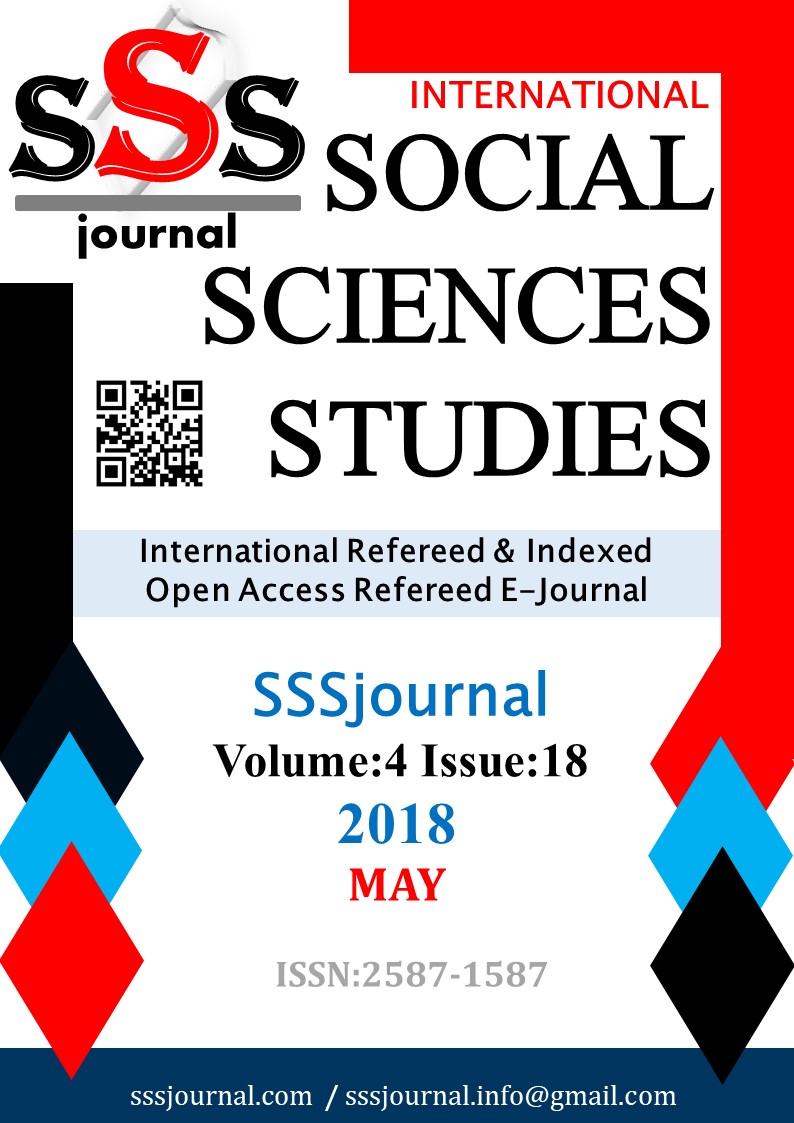Author :
Abstract
Ölüm evrensel bir kavramdır ancak dünyanın farklı kültür dairelerinde farklı şekillerde kavranıp algılanmıştır. Bahsi geçen kavram, yalnızca farklı ulus ya da kültürler tarafından değil felsefe ve bilimin farklı disiplinlerince de değişik şekillerde ele alınmıştır. İnsanlığın var olduğu günden bugüne üzerinde fikir üretmeye, çeşitli yönlerden idrak ve ifade etmeye çalıştığı ölüm kavramı aslen bireyle ilgili bir kavram olmakla beraber toplumu da yakından ilgilendirir. Bir toplumun ölümle ilgili genel yargılarını belirleyebilmek o toplumun metafiziğe, uhrevî hayata yahut bilinmezliğe yönelik bakış açısını anlamakla ilgili eşsiz veriler sunar. Bu verileri elde edebilmek adına toplumun yapı taşı olan bireyin varoluşuna ait bir sonsöz olarak değerlendirilebilecek mezar taşı metinleri en elverişli kaynaklardan biridir. Toplumun her kesiminin düşünce kalıplarının ortaya çıkarılması da dar alan çalışmalarıyla mümkün olabilir. Bu çalışmada, söz konusu bağlamdan yola çıkılmak suretiyle Bartın ve ilçelerinde bulunan mezarlıklar araştırılarak mezar taşı metinlerinden bilhassa manzum olanlarına göz atılmıştır, elde edilen metinler içeriklerine göre tasnif edilmeye çalışılmış böylece hem bu sözlerin kültürel konumları belirlenmiş hem de Bartın halkının ölümle ilgili tasavvurlarını dile yansıtış biçimleri mezar taşları aracılığıyla irdelenmiştir.
Keywords
Abstract
Death is a universal concept but it comprehended and perceived differently by different cultural environtments. This concept mentioned is not only handled by different nations or cultures but also by different disciplines of Philosophy and Science. The death, which humanity has tried to produce ideas about it from ancient times, to understand and express it in various ways, is actually a concept related to the individual, but it is also closely related to society. Determining the general judgements of a society about death gives us unique datas with regard to the relevant nation’s perspective about metaphysic, otherworldly life or obscurity. Gravestone texts can regarded as epilogues of the individuals who are the basic unite of a society. They are one of the most convenient cultural materials for acquiring aforementioned datas. Revealing the mindscapes of the all parts of a society can be possible especially with the small area fieldworks. In this work, we investigated the graveyards of Bartın and its districts and study with the gravestone texts which are written in verse particularly base on the aforesaid context. Furthermore, we tried to classify acquired texts with regard to their contents. In this way, we specified the cultural position of this texts and we examined how the people of Bartın reflect their ideas about the death concept to language.
Keywords
- Arslan Sağıroğlu, A. (2017). “Taşlar Konuşur, Türk Mezar Taşlarının Biçim Dili”, Uluslararası Türkçe
- Arslan Sağıroğlu, A. (2017). “Taşlar Konuşur, Türk Mezar Taşlarının Biçim Dili”, Uluslararası Türkçe Edebiyat Kültür Eğitim Dergisi Sayı 6/3: 1923-1937.
- Eroğlu A. H. (2000). "Kırgızistan'da Bağımsızlık Sonrası Milli İdeoloji Arayışı Çerçevesinde Tenircilik", Ankara Üni. İlahiyat Fak. Dergisi: 1-21.
- Ersoy R. (2002). “Türklerde Ölüm ve Ölü İle İlgili Rit ve Ritüeller”, Millî Folklor, Yıl 14 Sayı 54: 86-101. Günay Ü. & Güngör H., (1998). Türk Din Tarihi, Laçin Yayınları, Kayseri.
- Haseki H. (1971). Plastik Açıdan Türk Mezar Taşları. İstanbul Devlet Güzel Sanatlar Akademisi, İstanbul.
- İltar G. (2003). “Eski Türklerde Mezar Kültü ve Günümüze Yansımaları”, Türk Kültürü ve Hacı Bektaş Velî Araştırma Dergisi, Güz 2003, Sayı 27: 7-16.
- Koç E. (2013). “Gabriel Marcel Felsefesinde Varoluşsal Bir Problem Olarak Ölüm”, SDÜ Fen Edebiyat Fakültesi Sosyal Bilimler Dergisi, Ağustos 2013, Sayı 29: 201-217.
- Küçük M. A. (2017). “Geleneksel Türk Dini İnanışlarından Mitolojiye: Ölüm/Obur Ruhlar”, Gazi Türkiyat, Bahar 2017/20: 25-53.
- Malpas J. & Solomon R. C. (2005). Ölüm ve Felsefe, İthaki Yayınları, İstanbul.Örnek, S. V. (1977). Türk Halk Bilimi. Türkiye İş Bankası Kültür Yayınları, İstanbul.
- Pattabanoğlu, F. Z. (2015). “Seneca’da Felsefe ve Ölüm”, Süleyman Demirel Üniversitesi Sosyal Bilimler Enstitüsü Dergisi Yıl: 2015/2, Sayı 22: 137-158.
- Platon. (2001) Phaidon, çev.: H. R. Atademir & K. Yetkin, Sosyal Yayınlar, İstanbul.Platon. (2010). Sokrates’in Savunması, Çev.: Özgü Çelik, Say Yayınları, İstanbul.
- Polat E. & Aşkın Z. (2017). “Ölüm Kavramının Heidegger ve Sartre Felsefesindeki Yeri”, Kilikya Felsefe Dergisi, 2017/1: 42-60.
- Tanyu H. (1986). İslamiyetten Önce Türklerde Tek Tanrı İnancı, Boğaziçi Yayınları, İstanbul.
- Türkan, H. K. (2012). “İskenderun Mezar Taşı Sözleri Üzerine Bir İnceleme”, Turkish Studies-InternationalPeriodical For The Languages, Literature and History of Turkish or Turkic, Volume 7/4, Fall 2012: 3025- 3044.
- URL1- TDK Büyük Türkçe Sözlük, http://www.tdk.gov.tr/index.php?option=com_bts&view =bts (16.03.2018)





